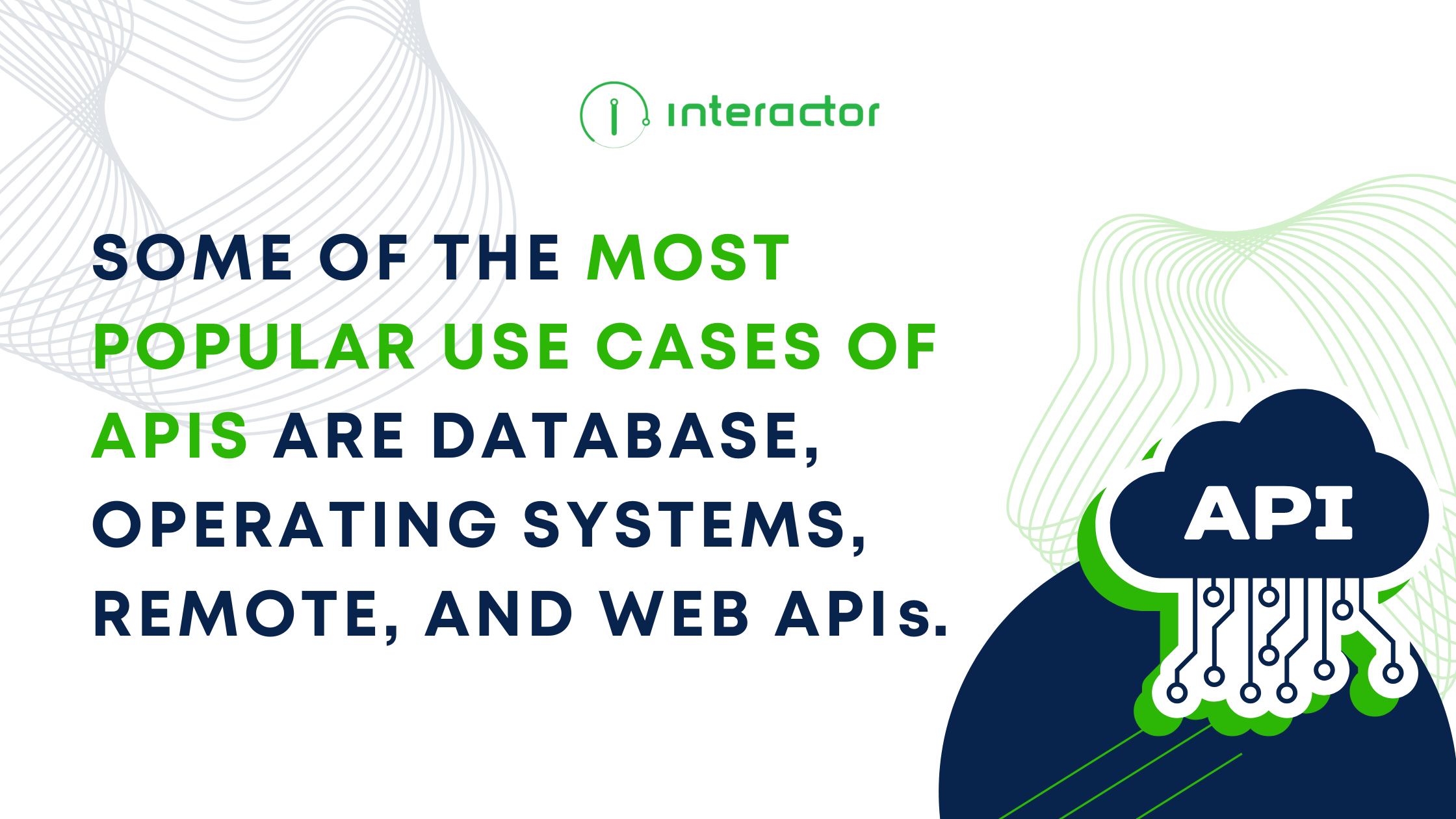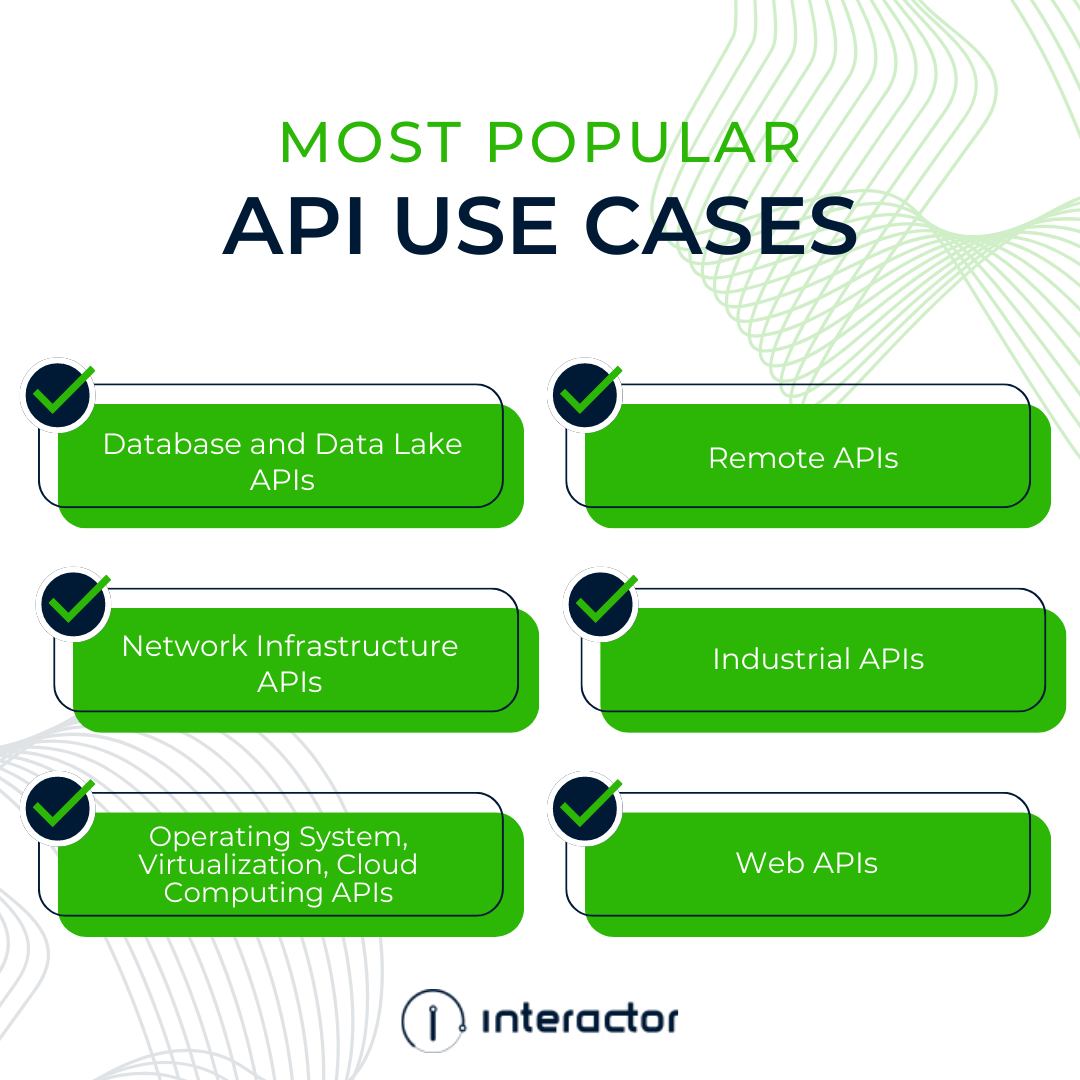Most Popular API Use Cases
APIs have revolutionized the way businesses interact with their customers and partners. They enable companies to easily access and leverage the resources and capabilities of other organizations, allowing them to build new products and services faster and more efficiently.
Whether you are a developer, business owner, or simply work with data and services, this blog will provide a comprehensive overview of the most common API use cases and how they can drive innovation and growth in your company.
Some of the most popular use cases of APIs are database, operating systems, remote, and web APIs.
Database and Data Lake APIs: Database APIs allow developers to access the data stored in databases. Some popular database APIs include SQL, MySQL, NoSQL, Hadoop, Splunk, Elastic, and Scada. These APIs are used in various applications, including web development, mobile app development, and data analytics. In modern data applications, direct access to the Database APIs is obfuscated using an API layer. That allows the data managers to control the data access and availability without giving access to the database. The API specialized tools provide more features that enable additional data control and protection using rate limiting, SQL injection, and data masking.
Network Infrastructure APIs: Network infrastructure APIs allow developers to access, control, and automate network resources and devices. They provide a set of standard interfaces for interacting with the network, including configuration, monitoring, and troubleshooting. Some popular network infrastructure APIs include SNMP, Syslog, NetFlow, NETCONF, YANG, and OpenDayLight. These APIs are used in various applications, including network management, security, and monitoring. Only a few solutions can support these network and telco-specific APIs.
Operating System, Virtualization, Cloud Computing APIs: Operating system APIs allow developers to access and control a computer system's various hardware and software resources. They provide a set of standard interfaces for interacting with the operating system, including file and memory management, process control, and networking. Some popular system APIs include Windows API, Linux API, Docker, Kubernetes, and cloud computing such as AWS, Azure, and Google. These APIs are used in various applications, including deployment automation, testing automation, and data collection for monitoring.

Remote APIs: Remote APIs allow developers to access and control remote devices over a network. They provide a set of standard interfaces for communicating with the device, sending commands, and receiving data. Some popular remote APIs include REST, SOAP, and JSON-RPC. These APIs are used in various applications, including the Internet of Things (IoT), smart home automation, and remote monitoring.
Industrial APIs: Many industries, including manufacturing, oil and gas, power and energy, and transportation, use APIs for automation and monitoring. They enable businesses to improve efficiency while attracting customers by integrating their industrial systems with those of their customers and partners, providing a seamless and efficient way to exchange data and perform specific tasks. Industrial APIs are device manufacture-specific, but many companies follow standards such as MQTT and OPCUA for better interoperability.
Web APIs: Web APIs are the most well-known ones that allow developers to access and control web-based resources and services over the internet. They provide a set of standard interfaces for interacting with web-based systems, including retrieving and updating data, performing actions, and accessing resources. Some popular web APIs include HTTP, HTTPS, and XML. These APIs are used in various applications, including web development, mobile app development, and data analytics. There are tens of thousands of Web APIs, including social media, payment, healthcare, and geolocation.
Development teams today are challenged to hire people with the required technical knowledge and experience. The unique makeup of API AutoFlow helps solve this problem for teams. Within API AutoFlow, engineers can easily access these different APIs to develop applications more efficiently without needing as much technical knowledge.
We’re here to help.
We’d love to equip your team with seamless and efficient ways to exchange data and perform specific tasks, leading to increased efficiency, improved customer experience, enhanced security, and greater scalability, regardless of the API use cases. Schedule a demo today.

March 1, 2023

Comments